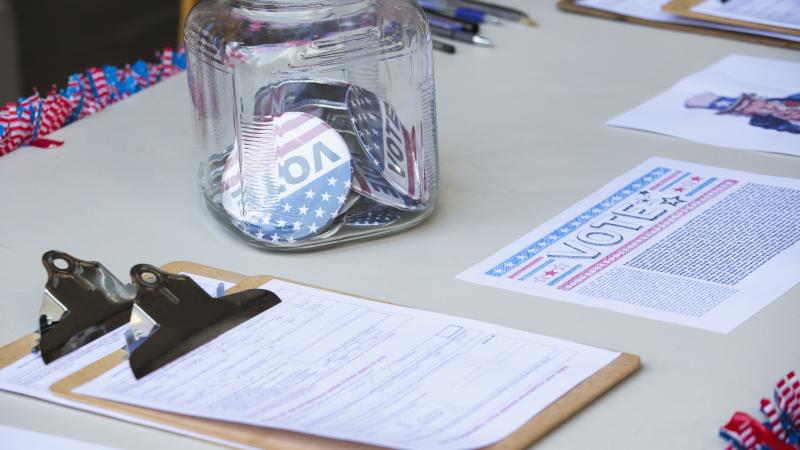Pelosi's top security aides got warning about Capitol breach night before Jan. 6 riot, memos show
Newly unearthed memos may explain why Nancy Pelosi privately expressed she felt responsible for Jan. 6 security failures.
Two top House security aides under then-Speaker Nancy Pelosi got stark warnings from police the night before the Jan. 6 riots that protesters might try to breach the U.S. Capitol through its tunnel systems and block lawmakers from voting to certify Joe Biden's presidential election win, according to newly obtained memos and text messages.
The documents obtained by Just the News also confirm that Pelosi's team played a role in the botched security planning for that fateful day.
"We have identified numerous open source comments indicating groups intentions of finding the tunnel entrances and confronting/blocking the MOCs (Members of Congress)," Capitol Police Deputy Chief Sean Gallagher wrote Deputy House Sergeant at Arms Tim Blodgett at 8:55 p.m. on Jan. 5, 2021 in an email that got forwarded less than an hour later to Blodgett's boss, then-Sergeant at Arms Paul Irving. The second time is listed in UTC, or Coordinated Universal Time.
A second warning was sent later that evening about possible threats against Supreme Court justices, and the sergeant-at arms-office scheduled a briefing for Pelosi's then-chief of staff Terri McCullough the next morning, hours before the breach occurred, according to the messages obtained by House Administration Oversight Subcommittee Chairman Barry Loudermilk.
Congressional investigators believe the texts and emails may explain why Pelosi in a recently surfaced video shot by her daughter as they were fleeing the Capitol on Jan. 6. claimed responsibility for security failures that day despite her claims to the contrary.
"We have responsibility, Terri," Pelosi is heard saying on the videotape to McCullough. "We did not have any accountability for what was going on there, and we should have. .. I take responsibility for not having them just prepare for more.”
Loudermilk told Just the News his committee plans to question Pelosi's staff about what was meant on the videotape and how they reacted to the emailed warnings from Capitol Police.
"I think it was clear at that moment. She understood. They messed up. She or her staff are the ones who denied the request by Chief (Steven) Sund for the National Guard," he told the "Just the News, No Noise" television show.
"There's a lot of information that people on Pelosi staff I think need to answer, some questions. So we're wrapping up some other areas while we're still going down this path," Loudermilk added.
The U.S. Capitol Police did not respond to a request for comment from Just the News. Former Sergeant at Arms Irving could not be reached for comment.
Pelosi and House Democrats have repeatedly tried to deny blame for not accepting an offer from then-President Donald Trump's administration to have National Guard pre-posted at the Capitol to augment police security, and suggesting that security decisions were left to the sergeant of arms and Capitol Police. Pelosi's staff doubled down on those claims in a statement to Just the News.
“Numerous independent fact-checkers have confirmed again and again that Pelosi did not plan her own assassination on January 6th. The Speaker of the House is not in charge of the security of the Capitol Complex – on January 6th or any other day of the week," a spokesperson for Nancy Pelosi told Just the News.
But the new emails, text messages, and documents obtained by Just the News show that in the days leading up to Jan. 6, 2021, Pelosi’s office was in fact involved in Capitol security planning, receiving requests for edits and feedback and being kept informed of the security situation by Irving.
That pattern continued until the day of the Capitol riot. A series of text messages show that Pelosi’s chief of staff, McCullough, was in contact with Irving for updates in the days leading up to and on the morning of Jan. 6. According to the Congressional Research Service, the Sergeant at Arms operates "under the direction of the Speaker" to maintain order and decorum in the House. He is also responsible for Capitol security and the safety of members alongside his Senate counterpart.
“Paul - when is a good time to talk about this afternoon and the floor tomorrow?” McCullough asked in one email.
“I need a few minutes. How about after 6:15 pm this evening, or of course anytime tomorrow morning,” Irving replied.
The new communications were not referenced in the Democrat-led Jan. 6 Select Committee’s report on the events leading up to, during, and after the Capitol breach. A Capitol Police Inspector General flash report in the aftermath discusses the failure for intelligence to be widely disseminated, but does not provide any specifics—though much of this section of the report is redacted.
The lone references to any communications with Pelosi's staff came in a 2022 report issued by Rep. Jim Banks, R-Ind. Loudermilk's staff then formally obtained the communications from Capitol Police.
The emails show that McCullough was active in providing the feedback from the Speaker’s office on Jan. 6 security plans. Two days before the Joint Session of Congress to certify the Electoral College votes, McCullough received an email from Irving’s office forwarding a letter it planned to send to all House members. The communication shows that Pelosi’s office had the opportunity to make edits to the information and provide suggestions about the content of the letter.
“Terri / Jamie — Please see the attached DRAFT Dear Colleague regarding security information for January 6 Joint Session. Please let us know if you have any edits, comments or concerns,” Kathleen Joyce from the Sergeant at Arms office wrote. The records show that McCullough responded with suggestions, which were incorporated in the final letter draft.
That "dear colleague" letter was sent out to all members and their staff on the same day, with the suggested edits from Pelosi's office included.
You can read the email and letter below:
The security preparations for the certification seemed to be proceeding smoothly until the night of Jan. 5 when the Capitol Police began forwarding intelligence warnings to Irving raising concerns about safety and interruptions of the count.
At 8:55 PM on Jan. 5, -- the day before the riot -- Deputy Chief Sean Gallagher emailed Sergeant at Arms officials to warn them of an “Interest in Tunnels Leading to the US Capitol.” This email was forwarded to Irving at 1:59 AM on Jan. 6 by his deputy Blodgett.
“Meant to send this earlier today, but got tied up, we are running this out, but there is a historical website called WashingtonTunnels.com that has a bunch of information, to include maps on our Capitol system tunnels. The owner of the website submitted an online tip to the FBI National Threat Operations Center (NTOC) stating that he noticed a significant uptick in new visitors to his website,” Gallagher wrote.
“We have identified numerous open source comments indicating groups intentions of finding the tunnel entrances and confronting/blocking the MOC s. In addition, they specifically discuss attempting to get into the LOC to go to the basement and use the LOC tunnel to get to the Capitol,” he added. The LOC refers to the Library of Congress, through which access to the Capitol can be had.
He also described a "huge uptick with reporting via open source” of a group’s plan to try and form a perimeter around the Capitol to prevent members of Congress from reaching the building. Gallagher concluded his email by informing the staff that the department would continue to monitor the intelligence.
Just the News previously reported that a top aide to Senate Majority Leader Chuck Schumer, Kelly Fado, received a similar email from Gallagher pointing to the potential danger, though this information was not distributed to the then-Chief of the Capitol Police nor any of the frontline officers tasked with protecting the capitol that day.
At 3:30 AM on Jan. 6, the deputy sergeant at arms, Blodgett, forwarded a separate warning to Irving, according to the emails, this time about chatter online that indicated a specific group, called the Red State Secession was collecting addresses for Supreme Court Justices. Though no members of Congress were mentioned, the Capitol Police warned that they were monitoring the the group.
“Wanted to bring to your awareness, there is a website called Red State Secession that has posted an article requesting that users submit addresses of residences and offices of politicians/judges/lobbyist,” Gallagher wrote.
“It is possible that the group may have similar action plans for Members of Congress, we have added this site to our daily monitoring for mention/listing of any MOC,” he added.
Text messages show that Irving was in contact with Pelosi’s chief of staff the following morning for a briefing, making it likely that she—and Pelosi’s office—was made aware of the potential threats.
“Good morning Paul. Let me know a good time to connect this morning,” McCullough said in a text message to Irving.
Irving replied that he would get back with her “shortly.”
In June, new footage of Pelosi on Jan. 6 was released by the House Administration Subcommittee on Oversight that showed the then-Speaker believed she had at least some responsibility for what had just happened, Just the News reported. The footage was recorded by Pelosi's daughter Alexandra, who helped HBO shoot a documentary about the Jan 6 riot.
“We have responsibility, Terri,” Pelosi exclaimed to her chief of staff, McCullough, at the beginning of the short video. “We did not have any accountability for what was going on there, and we should have,” Pelosi said. “This is ridiculous.”
“You’re going to ask me — in the middle of the thing when they’ve already breached the inaugural stuff — ‘should we call the Capitol Police, I mean the National Guard?’” she added. “Why weren’t the National Guard there to begin with?”
“They thought that they had sufficient…resources” her chief of staff, McCullough, replied as the Speaker’s SUV raced through an underground parking garage.
“No, that’s not a question of how they had… they don’t know. They clearly didn’t know. And I take responsibility for not having them just prepare for more,” said a clearly frustrated Pelosi.
Whatever the Speaker said in private, she did not say in public. One month after the breach at the Capitol, Speaker Pelosi deflected from the suggestion that her staff had any ability to influence the security preparations. "I have no power over the Capitol Police," she declared.
[Correction: an earlier version of this article mistakenly identified the time an email was forwarded to Irving, which was supposed to be in UTC instead of Eastern Standard Time]














